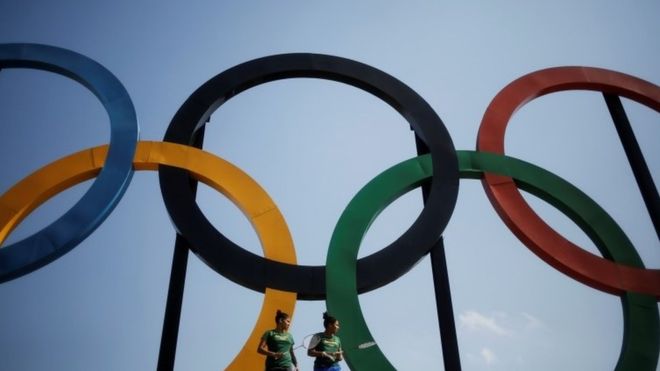



The Olympic Games are due to begin in Brazil on 05 August
THE International Olympic Committee (IOC) has said that it sees no need to cancel, delay or move the Rio Olympic Games because of the Zika virus threat.
However IOC medical director Richard Budgett said that it would continue to monitor the situation closely.
Dr Budgett was responding to a call by Canadian health Professor Amir Attaran for the Games to be postponed or moved.
Prof Attaran said that the influx of visitors to Brazil would result in the avoidable births of malformed babies.
“If the IOC and the World Health Organisation (WHO) do not have the generosity of heart to delay the games to prevent children being born and disabled their whole lives, then they’re among the cruellest institutions in the world,” Prof Attaran said in a telephone interview with the Associated Press news agency.
“What I’m asking for is a bit of delayed gratification so that babies aren’t born permanently disabled.”
Prof Attaran – a public health specialist – argues that Zika is far worse than the IOC is willing to admit.
In an article for the Harvard Public Review he says that Rio de Janeiro is more affected by Zika than anyone expected and that all it takes is one infected traveller to start a process that could ultimately result in a “full-blown global health disaster”.
He argues that if the Games go ahead, it would be especially unfair on countries like Nigeria, India and Indonesia, which do not have the same resources to fight Zika as Brazil.
But his point of view is hotly contested by Olympic and global health authorities including the WHO, who are adamant the 5-21 August Games will not be derailed by the virus.
The IOC – which adheres to the WHO’s advice – insisted there were no plans to relocate or postpone the games.
“The clear statements from WHO that there should be no restrictions on travel and trade means there is no justification for cancelling, delaying, postponing or moving the Rio Games,” Dr Budgett said.
“The IOC will continue to monitor the situation very closely and work with the WHO, and we’re confident as we’ve been advised by the experts that the situation will improve over the next three months.”
A separate IOC statement said that plans were in place to target mosquitoes and deal with their stagnant water breeding grounds..
The statement said it was important to remember the Olympic and Paralympics Games are taking place in the winter months of August and September, when mosquitoes should not be so abundant.
The Olympics are expected to attract about 500,000 visitors from abroad. BBC
Follow us on Twitter @FingazLive and on Facebook – The Financial Gazette
Sorry. No data so far.

